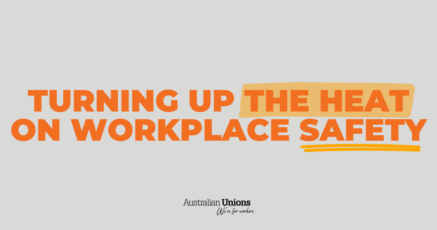This week, the Senate debated a partial, incomplete and cherry-picked list of recommendations which were drawn from the Sex Discrimination Commission’s Respect@Work report, published over a year ago.
In this report, Commissioner Kate Jenkins described sexual harassment as “endemic” in Australia, with their 2018 survey data finding that 33% of people who had been in the workforce in the previous five years reported experiences of sexual harassment. The report highlighted that those who are most at risk are those who experience other forms of vulnerability and disadvantage, especially Aboriginal and Torres Strait Islander people, disabled people, LGBTIQ+ people and people from ethnic, religious and racial minority groups. These groups are more likely to experience ‘intersecting’ forms of discrimination where sexual harassment reinforces also contribute to making harassment and violence harder to report, a disproportionate “burden” which the report finds must be more fully taken up by Governments and by employers in order for meaningful change to occur.
The Morrison Government’s response to the report was slow, and only following significant public pressure did they release the plan “A Roadmap for Respect” earlier this year. This plan makes some acknowledgement of Jenkins’ findings, either through expressing some level of agreement, or through “noting” them. More of this inconsistent and piecemeal approach was reflected in the recognition of the Respect@Work findings which made their way to the Senate this week.
Here the Government proposed a highly selective and incomplete set of minor amendments which would make minimal impact on the kinds of structural causes the Respect@Work report highlighted. For instance, rather than proposing to embed a clear, direct prohibition on sexual harassment into workplace law, the Morrison government is proposing a limited process to be used only by current employees, where a high threshold of ongoing harm must be proven for any compensation. This is a familiar Government playbook choice: to make the process of demonstrating need and demonstrating that harm has occurred complex, onerous and punitive, so that claimants are deterred from the process.
Meanwhile, the Government claims that sufficient “positive duty of care” is already enshrined in workplace health and safety laws and that mandating further preventative action is therefore unnecessary. This is despite Jenkins’ clear findings that existing structures have been demonstrated to be insufficient and that there is a need to “shift the burden from individuals” and towards “employers taking proactive and preventative action.”
This cultural shift towards governments and employers shouldering more of the burden that individuals have suffered under, is one that the Morrison Government refuses to engage with meaningfully. This is a choice to maintain a system whereby, as the Respect@Work report finds, those who experience harassment, discrimination and violence must also carry the financial, career, and health costs of that oppression, often without meaningful support or intervention tailored to their needs and circumstances.
This limited action is a political choice, and others are not only available, but are necessary. Writing in The Guardian last week, Michele O’Neil highlighted some of the policies which could be enacted now to begin addressing the culture of gender- and sexuality- based violence, including enacting paid leave for all workers experiencing domestic and family violence. The Respect@Work report also suggests that “a specific form of leave” for those who have experienced sexual harassment at work, as part of a wider shift towards a “victim-centred” approach which prioritises support, prevention, and long-term cultural change.
No single policy or action of this nature will be sufficient – what is needed is a wholesale commitment to cultural change, pursued over time, with ongoing assessment, measurement and collaboration with affected communities and experts to ensure that safety from sexual harassment and violence is enshrined in all parts of society. Implementing the Respect@Work recommendations in full, including applying them within the workplace culture of Parliament, would be a crucial step towards enacting that much-needed cultural change.
Yet as the title of their own response suggests, “respect” is not the starting point for this Government; rather it’s a distant destination at the end of a metaphorical “roadmap,” with no clear direction on how that goal might be achieved. As the selective presentation of recommendations in the Senate this week showed, there’s little interest from this Government in making any kind of meaningful headway along that journey. Nonetheless, these issues are, as Jenkins has stated elsewhere, “everybody’s business”.






SHARE:
Respect@Work must be the starting point